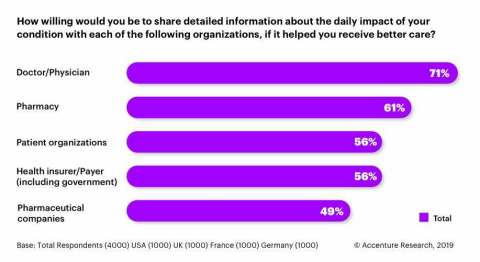FRANKFURT, Germany & NEW YORK--(BUSINESS WIRE)--To deliver better patient experiences, pharmaceutical companies should collaborate with nonprofit organizations that provide support services and advocate for patients, according to a new study from Accenture (NYSE:ACN).
Based on a survey of 4,000 patients in the U.S. and Europe, the Patient Services Study investigates the role that patient organizations play in providing support, information and other services to patients and whether better collaboration with pharma companies could improve the patient experience and care. The study focused on three different diseases / medical conditions — migraine, rheumatoid arthritis and chronic lymphocytic leukemia — selected due to their significant, yet different, impact on patients’ daily lives.
The survey revealed that patients, regardless of their country or disease state, highly value services from patient organizations and prefer them over those from pharmaceutical companies. This holds true not only for emotional support and access to community support groups — services that patient organizations often provide — but also for information on therapies and clinical trials, which has more traditionally been provided by pharma companies.
Less than half (47%) of the surveyed patients said that pharma companies understand their emotional, financial and other needs related to their condition. In fact, patients rate pharma companies lower on this than doctors/physicians, payers, pharmacies and patient organizations. The biggest gap is in the U.S., where 67% say patient organizations understand their needs compared to just 48% who say the same for pharma.
Yet despite these findings, most patients — 84% — believe that patient organizations should be working together with pharma companies to create a more seamless experience for them. In fact, patients said that to improve their experience, it is more important that patient organizations work together with pharma companies than with other healthcare players, including healthcare providers, payers and pharmacies. They also said they would be willing to share more detailed information about the daily impact of their conditions if it helped them receive better treatment.
“These findings makes sense, given the more targeted nature of New Science — which is more personalized and often more complex in its treatment approach — and that delivering real impact requires a deeper understanding of the patient,” said Eva Wiedenhöft, a managing director in Accenture’s Life Sciences practice. “In this regard, a stronger collaboration between pharma and patient organizations can provide benefits for both parties.”
Among the top benefits that patients believe would result from a better level of collaboration between patient organizations and pharma companies are easier access to information on their condition and treatments (cited by 56% of respondents), easier access to treatment (56%) and more personalized care (54%).
“By increasing their association with patient organizations, pharma companies can get closer to patients and develop a much deeper understanding of them as people, not just patients,” said Keena Patel, a managing director in Accenture’s Life Sciences practice. “Our research revealed that people are engaging early and often with patient organizations — much earlier and more often than they do with pharma. Collaborating with one another could enable a much richer understanding of patient needs, earlier in the care process and potentially lead to creating entirely new services that dramatically increase the standard of care, particularly in the US.”
The report notes that in Europe there was no clear organization or player in the healthcare ecosystem that stood out as owning the care experience, with patients there using healthcare providers, payers, patient organizations, pharmacies and pharma companies nearly evenly. Despite this, most European respondents expressed frustration with the overall care experience and support they receive.
“This indicates an opportunity for pharma companies to take a stance on how they want to maximize their contribution to patient experiences and outcomes beyond the immediate impact of the drug,” said Eva Wiedenhöft. “For instance, it could help them identify how much of the patient experience they wish to own, what service areas they want to excel in and to what extent, as well as how they plan to collaborate with other players in the healthcare ecosystem to drive patient experiences and outcomes more holistically.”
Methodology
To understand the role that patient organizations play in providing support, information and other services for patients, Accenture surveyed 4,000 patients ranging from 18 to older than 65 in France, Germany, U.K. and the U.S. with one of three specific conditions — migraine, rheumatoid arthritis and chronic lymphocytic leukemia. The goal was to learn about their experiences with services offered by patient organizations in relationship to services offered by pharmaceutical companies and other healthcare players. The survey was conducted via telephone and finalized in April 2019.
About Accenture
Accenture is a leading global professional services company, providing a broad range of services and solutions in strategy, consulting, digital, technology and operations. Combining unmatched experience and specialized skills across more than 40 industries and all business functions — underpinned by the world’s largest delivery network — Accenture works at the intersection of business and technology to help clients improve their performance and create sustainable value for their stakeholders. With 482,000 people serving clients in more than 120 countries, Accenture drives innovation to improve the way the world works and lives. Visit us at www.accenture.com.

